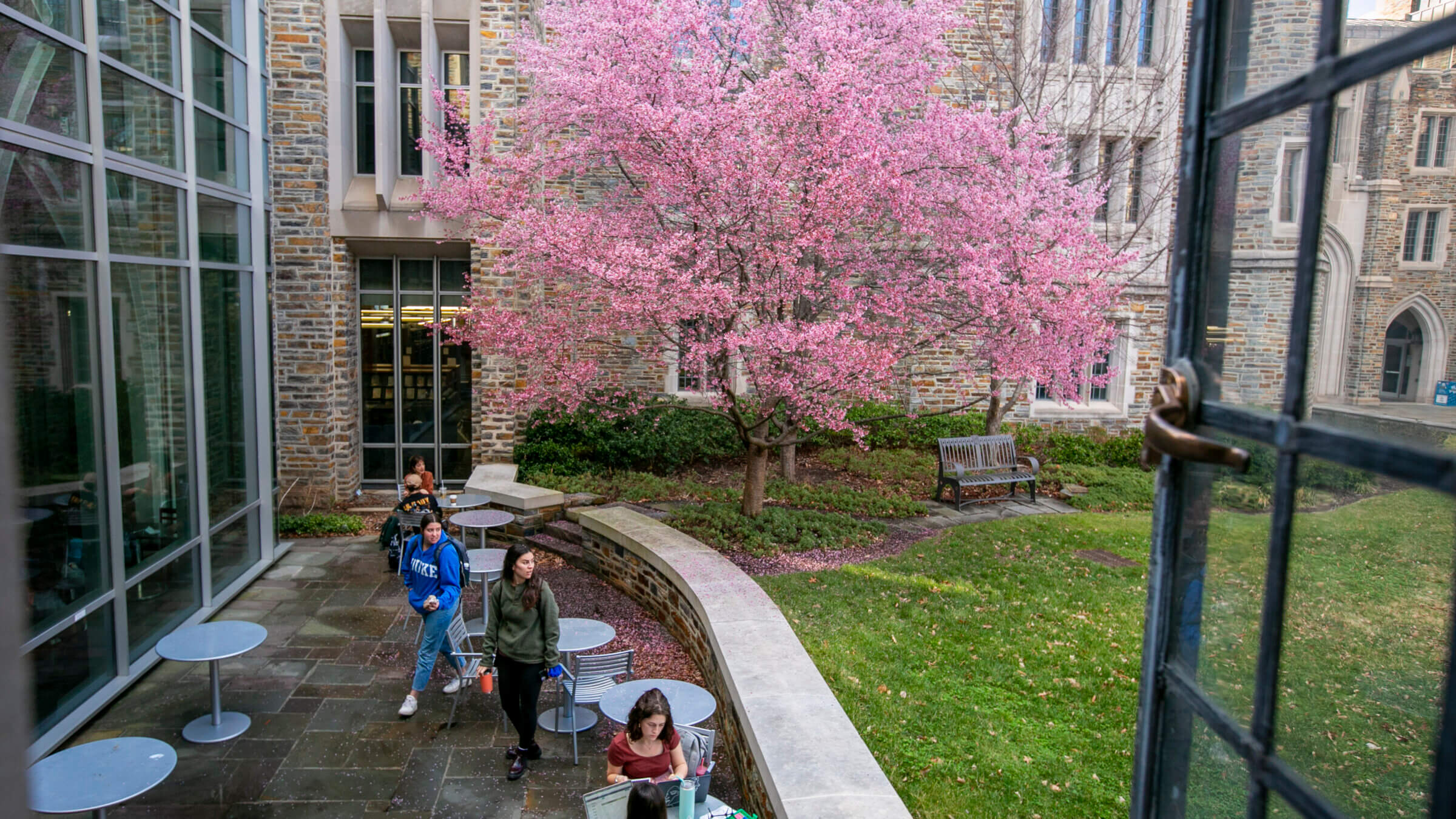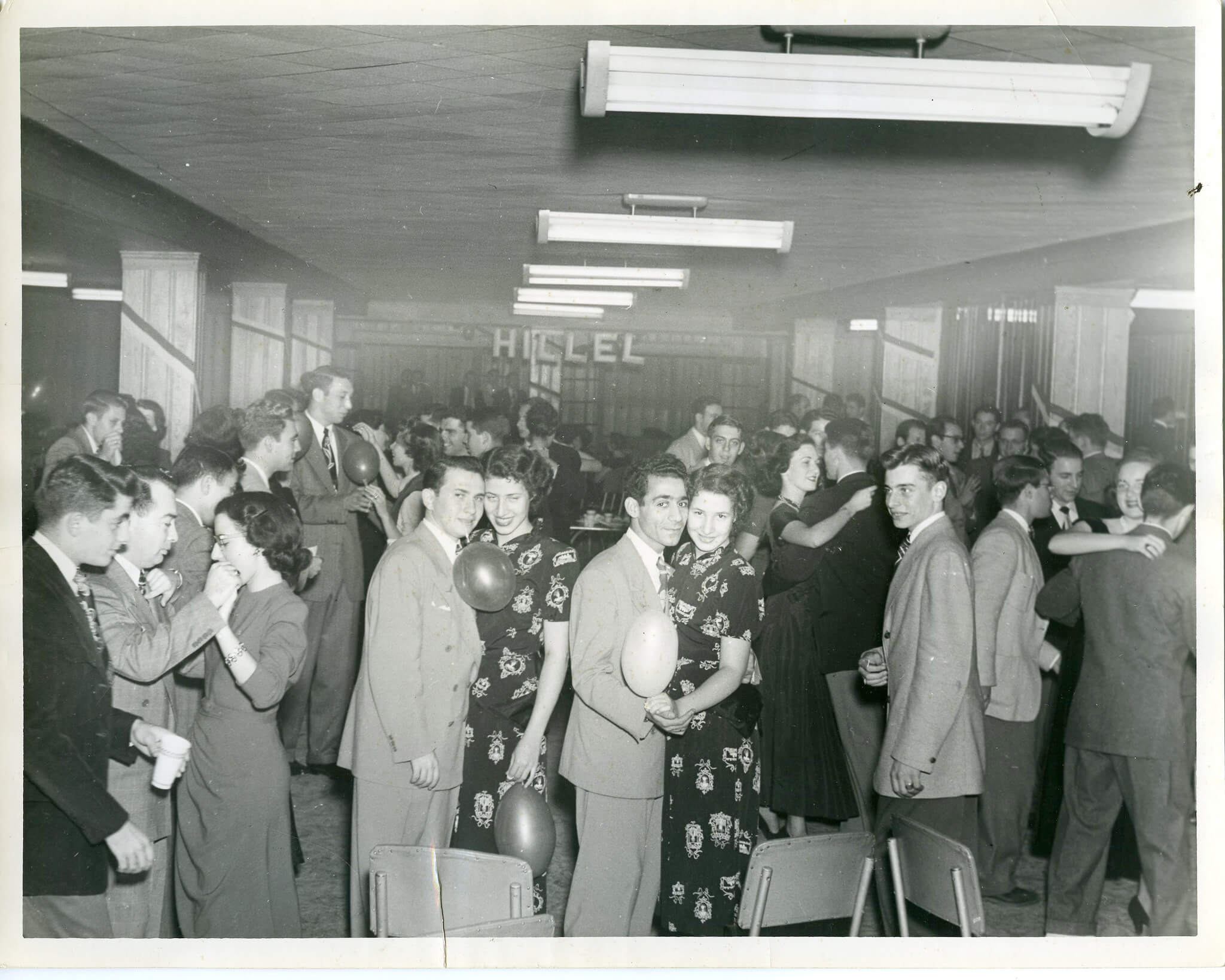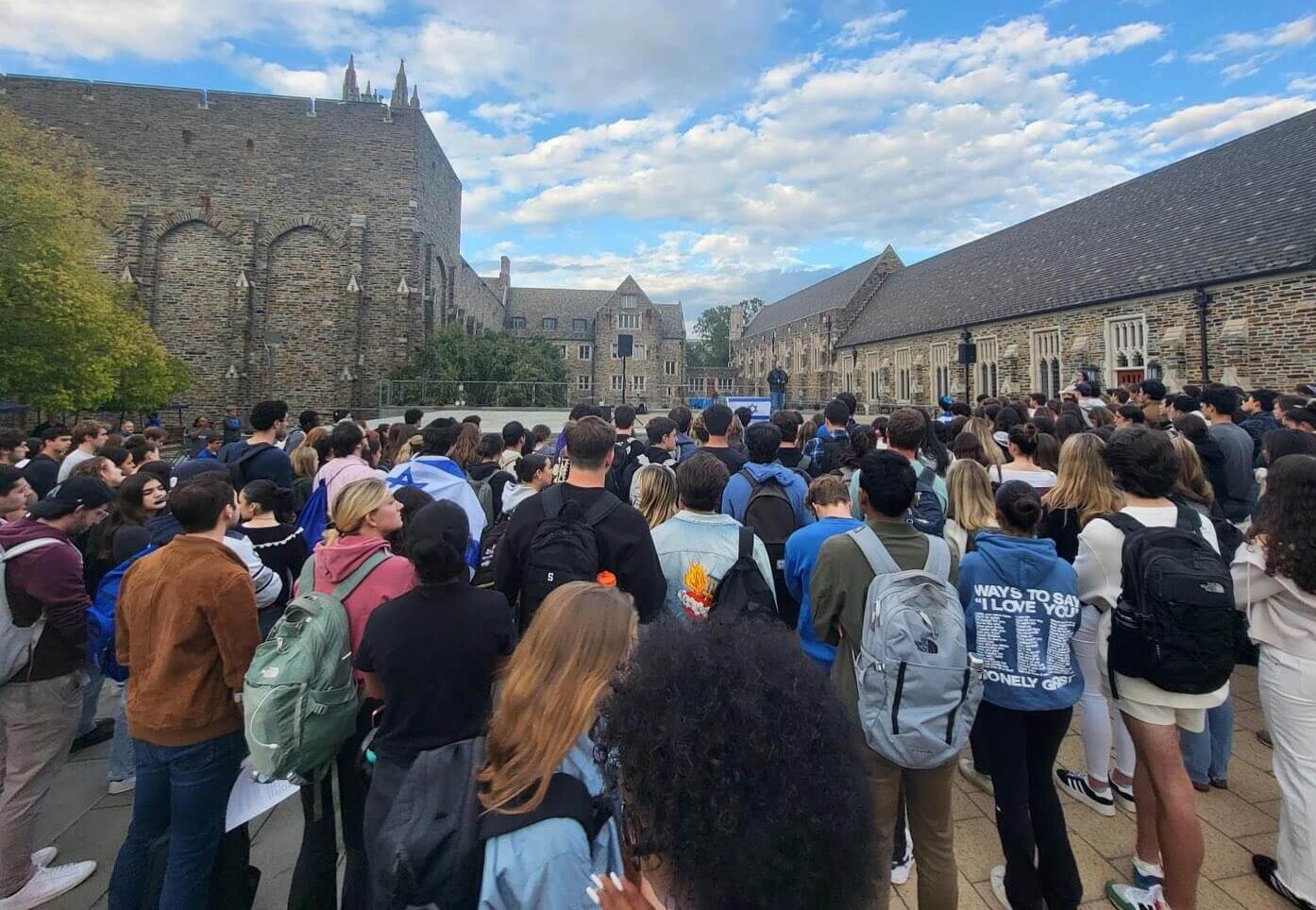At Duke, pro-Israel Jewish students go ‘on the offense’
Jewish students who support Israel said that an absence of raucous protests had allowed them focus on building support for Israel rather than playing defense

Students who support Israel at Duke University said the campus has not been rocked by the kind of protests that have swept other schools around the country, allowing them to focus on proactive programming. Photo by Getty Images
DURHAM, North Carolina — The only tents on Duke University’s campus this year had nothing to do with the Israeli-Palestinian conflict. Dozens of students camped out for weeks in February to secure basketball season tickets, predating the Gaza solidarity tent encampments that took over the quads of colleges and universities around the country two months later.
Those demonstrations never came to Duke, the rare elite university that escaped widespread rancor over Israel and concerns about antisemitism this year.
“We’re not consistently defending ourselves as Jews at Duke,” said Nicole Schwenk, a senior from Long Island. “We’re on the offense here.”
Pro-Israel Jewish students have covered a lawn at the center of campus with 1,200 Israeli flags to represent those killed on Oct. 7; placed empty Shabbat tables for the hostages held in Gaza outside of the student center; and covered a bridge on campus with posters of the missing.
It’s not that the opposition has taken a softer tone than at other schools rocked by protests over the past eight months. Some students walked out during Jerry Seinfeld’s commencement address last week over the comedian’s position on Israel, and the signs at Students for Justice in Palestine demonstrations — like “no peace on stolen land” — match the rhetoric some have complained about elsewhere.
But despite this, pro-Israel students feel confident at Duke during a period when many of their peers at other schools feel beleaguered. Over three days of reporting at the university, Jewish students and the staff and clergy who work with them explained this to me by pointing to a student body that shies away from political activism, an administration responsive to Jewish students’ concerns about antisemitism, and a rapidly growing Chabad that has mobilized to support Israel.
While Jewish students at other schools say administrators have mismanaged the protests or disregarded their concerns about antisemitism, many at Duke praised top leadership, which swiftly condemned the Hamas attack on Oct. 7 and subsequently banned a popular pro-Palestinian slogan from campus. Some said that two dozen students walking out of Seinfeld’s speech as he addressed 6,900 of their peers is less notable than the fact that Duke had welcomed the comedian in the first place, given that he had been heckled as a “genocide supporter” for his defense of Israel in recent months.
“It’s the very fact that they invited him,” said Rabbi Nossen Fellig, who runs the Chabad house for Duke undergrads.
Fellig himself seems to be key to the comfort of pro-Israel students on campus. He has helped organize and mobilize them to become zealous advocates at a university where concerns about political issues are overshadowed by sports fandom. Enrollment in the humanities has cratered over the past decade in favor of career-focused majors like computer science and economics.
“Different people apply to Duke than apply to northeastern Ivy Leagues,” said Jonah Scherl, a senior who served as co-president of Chabad on campus. “Duke has a less political campus.”
‘Jews can feel welcome at Duke’
Duke wasn’t always a bastion of pro-Israel activism, or home to any kind of Jewish community.
When Joel Fleishman came to campus as a law professor in 1971, he was assured that the southern university was committed to ending its restrictions on Jews. “The president said, ‘We’ve now canceled the Duke quota, Jews can feel welcome at Duke,’” Fleishman recalled. “And I think they were.”
Duke’s Jewish enrollment soared from the 3-5% allowed under a series of quotas beginning in the 1930s to as high as 20% in the 1960s and has settled at around 800 undergraduates, or roughly 12% of the school, according to Hillel.

But it took decades for a Jewish infrastructure to emerge that could support the growing number of Jewish students arriving at the school’s Durham campus, which was built with tobacco fortunes and centered around its Gothic chapel. Hillel spent years holding services in the basement of the chapel before opening its own building in 1999, an era when Palestinian activism flourished on campus.
The Palestine Solidarity Movement, a spiritual precursor to National Students for Justice in Palestine, held a major conference at the school in 2004 over strenuous objections from the local Jewish community. “You should not think the truth is so weak that it needs the power of suppression,” Richard Brodhead, Duke’s president at the time, told the audience at a local Reform synagogue.
As all this was unfolding, Fleishman, who had hosted Jewish students at his home in the years before Hillel opened, continued his work in the background. A prodigious fundraiser who managed a 1980s campaign that brought Duke $221 million, he also pushed Duke to admit more children of wealthy families, including some Jewish ones.
He was also instrumental in bringing Chabad to Duke in 2015. Three years ago, Fellig and his wife moved from a duplex that struggled to accommodate Shabbat dinners into what had been the King’s Daughters Inn, a boutique hotel in a historic building on the edge of campus that was renamed the Fleishman House.
Fellig, a charismatic leader, likes to dance at campus events wearing a shirt emblazoned with “Chabad crazies,” a riff on “Cameron crazies,” the nickname for Duke’s fanatical basketball fans. He said Chabad’s Passover Seder drew some 400 students, half the estimated number of Jewish students at Duke.
‘Finding your Zionism’
Many Jewish students at Duke are drawn to the sense of community that Chabad provides, along with home-cooked food and wine at Shabbat dinners that draw nearly five times the number of students who spend Friday nights at Hillel.
The shift toward Chabad has also had political implications.
The lobby of Duke’s Hillel building is full of Israeli flags and memorial candles for the victims of Oct. 7, and Joyce Gordon, the director, wore a dog tag to symbolize support for the Israeli hostages in Gaza during a recent interview.
But Duke’s Hillel, officially known as Jewish Life at Duke, is also part of the school’s student affairs department, providing certain advantages — Gordon and her staff have the ear of top administrators and have done antisemitism trainings for dozens of staff and faculty — but also encouraging the organization to maintain a tent big enough to include those sharply critical of Israel.

Gordon said she tries to empathize with Jewish students who identify as anti-Zionist because they oppose Israel’s occupation of the West Bank or the policies of Israel’s current government. “I’m not so sure that you fit into the anti-Zionist camp because you’re at the table with someone who has the same perspectives and identifies as a Zionist,” Gordon said she tells them.
(Hillel’s rabbi, Elana Friedman, who also serves as Duke’s Jewish chaplain, was ordained by the Reconstructionist movement, the most progressive denomination when it comes to Israel.)
Chabad takes a more straightforward pro-Israel approach.
“A lot of students find their Judaism here,” said Scherl, the student co-president. “And finding your Judaism is on the road to finding your Zionism.”
The Orthodox Chabad movement is not Zionist for religious reasons, and its campus centers vary in how they approach Israel, with much left up to whoever is running the local center. “Ideologically, Chabad are not Zionists,” Fellig said, “but they’re the ‘greatest supporters of Israel,’ whatever that means.”
At Duke, at least, that has meant sending 19 students on an “Israel solidarity trip” in February to “demonstrate what it means to be a proud Jew on an American college campus,” according to a fundraising appeal that netted $46,000 for the journey. Chabad also hosted a community vigil with Hillel, and raised $53,000 for Magen David Adom, in the days after Oct. 7.
More students have been drawn to Chabad since the Hamas attack. That tracks with national trends. A February study showed the share of Jewish college students who said they felt “very close” to a Jewish community jumped from 26% to 43% since Oct. 7.
But for many Jewish students that sense of community was tempered by fear: 42% said that “people will judge me negatively” for participating Jewish activities on campus.
Students at Duke exhibit little of that apprehension, which Schwenk, the senior who helped organize the Chabad Israel trip, said empowered them to focus on pro-Israel events and advocacy. “We’re not consistently defending ourselves as Jews at Duke,” she said.
Scherl said that breathing room has also meant that he’s “had the luxury” of focusing on things like inviting the editors at the Duke Chronicle to Shabbat dinner at Chabad.
“They showed up, they had the best time,” Scherl said. “Now we have direct lines to these reporters, who are more than happy and eager to cover our events.”
View this post on Instagram
In March, Students Supporting Israel, which includes many Chabad members, partnered with an evangelical Christian group to plant hundreds of flags at the center of campus marking the Israeli victims of Hamas. Students for Justice in Palestine staged a counterprotest, reading out the names of Palestinian victims of the war in Gaza.
Duke Chabad posted a video of two sides facing down. A student in a yarmulke, tefillin wrapped around his arm, leads the pro-Israel side in reciting the Shema, the holiest prayer in Judaism, with some members almost shouting the words at the protesters standing a few feet away.
“Proud to be Jewish,” the Chabad account wrote on Instagram. “Always.”
‘I resent that’
But the incident shook some Jews at Duke, who saw it as emblematic of a coarse style of pro-Israel activism gaining traction at the school.
Sami Jinich, president of J Street U at Duke, said he didn’t like seeing Jewish prayers used as a protest chant. “I’m not very observant but I do feel a little uncomfortable saying the Shema now,” he said.
D., a Jewish junior who spoke on the condition of anonymity because her campus job prohibits her from talking to reporters, said she feels alienated by Duke’s pro-Israel movement. Raised in a Conservative Jewish household in nearby Raleigh, she has been involved in some Hillel programming but said she has been harassed online for posts criticizing Israel.
“Jewish students came after me personally,” D. said.
She used to wear a “massive Jewish star” around her neck but took it off this semester because she began to feel — much like Jinich’s concerns about the Shema — that it had become a political statement. “I resent that,” she said.
But D. also hasn’t found a home with anti-Zionist activists at Duke, where she feels Jewish perspectives are not as visible.
View this post on Instagram
While Duke’s chapter of Students for Justice in Palestine has not been able to draw as many students as chapters at some other universities, its rhetoric sounds similar. On the last day of classes, a few dozen students gathered on the lawn outside the school’s iconic chapel with a cardboard sign reading “Popular University for Gaza.” Nearby, a flag for the Popular Front for the Liberation of Palestine, a Marxist faction associated with a bygone era of leftist Palestinian resistance but one that also participated in the Oct. 7 attack, hung on a large oak at the center of the demonstration.
At a protest the following day, a student climbed the statue of James B. Duke, the school’s founder, and wrapped a kaffiyeh around his head. A young woman held a sign reading, “no peace on stolen land.”
But neither demonstration at Duke, which called for the university to divest from Israel, seemed to impede students making their way to their final exams, or celebrating the end of the semester. A student in a flowing white dress took graduation photos in the background, while a group of boys in blazers sneered at the protesters as they walked by.
Gregory Philips, a Duke spokesperson, stood on the periphery of both protests and discouraged me from speaking with the protesters.
“There have been a number of demonstrations by Jewish students and Palestinian students,” Philips said. “We try to keep media away from these things because it tends to intimidate them.”
‘Do we look scared?’
Duke has taken other steps to control the campus climate, including the use of a strict permitting process for events that require student clubs to provide advance notice of any protests and work with the student affairs office to make sure they will not be disruptive.
They have also taken a hard-line stance on some Palestinian activism, including painting over the popular slogan “from the river to the sea, Palestine will be free” from a bridge at the center of campus that students decorate with graffiti.
Duke’s president, Vincent Price, and his top advisers huddled with Jonathan Greenblatt, chief executive of the Anti-Defamation League and a proponent of harsh crackdowns on campus protest, during a November visit to campus.
That has left some students, including Jews, feeling silenced.
“The university does not do as good a job at supporting the full variety of viewpoints — and particularly stances against genocide — as they would like to think,” said Abi, a Jewish leader of the Students for Justice in Palestine chapter at Duke who declined to provide her last name.
And Jinich, the J Street U president, said he’s glad Duke has avoided the “flare-ups” at other schools but wishes there was more activism that could make students engage more deeply with Israel’s conduct.
“There are things we should be uncomfortable about,” he added. “If you’re a Jewish student who’s very openly defending Israel — and openly Zionist — you have a responsibility to be a bit uncomfortable with what Israel is doing.”
Still, the school’s approach has led to the unusual circumstance of pro-Israel students, who have been the first to raise alarms about antisemitism at other campuses, celebrating Duke’s climate. That’s a message they have been able to share with anxious Jewish families visiting campus and wondering whether it is safe to send their child here.
Alanna Peykar, a Jewish senior studying economics, works as a tour guide at Hillel. She said that before Oct. 7, parents never asked about antisemitism, and now it’s many families’ first question. Peykar can reassure them that she’s comfortable wearing her Jewish necklace and pins supporting Israel without any concern for her safety.
“We’re all seeing what’s happening on Columbia’s campus and at Penn and Harvard,” said Peykar, who helps run Students Supporting Israel on campus. “This campus has nothing like that.”
On admitted students day, a mom walked over to the club’s table and asked Schwenk, another leader, whether she was scared to be Jewish at Duke. Schwenk was blasting Omer Adam, an Israeli pop star. The club was flying a huge Israeli flag and students stopped to wrap tefillin.
“Look at us,” she told the mom. “Do we look scared?”















